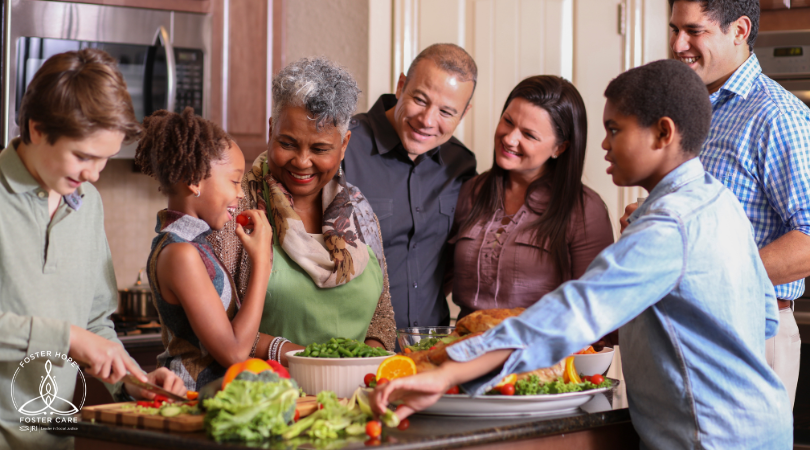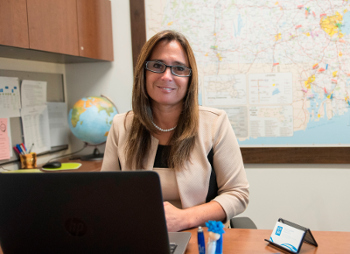Do you have a question about JRI services?

Thanksgiving: a time for gratitude, family, and gathering.
For children and youth in foster care, holidays of all sorts can be triggering. Thanksgiving can have additional layers of difficulty.
As caring adults supporting children and youth in foster care, it is important to understand these complexities and offer meaningful support.
Thankful
“Adoption loss is the only trauma in the world where the victims are expected by the whole of society to be grateful.”- Reverend Keith C Griffith
Children and youth do not choose to be in foster care or to become adopted. Those experiences are born of some of the most profound losses a person can suffer. While children in foster care and adoptive families may deeply love their foster/adoptive families, it is cruel and insensitive to expect a child to say that they are grateful to be in foster care or to be adopted. The most basic human right, to be raised by one’s birth family, to be safe with one’s birth family, to rely on one’s birth family, has been lost.
Many families gather around their holiday table and ask everyone to offer gratitude for something. If this is your tradition, think carefully about how that will feel to your young person. Talk with them about it in advance, even if they were in your home last year. Children and youth process foster care and adoption differently at different life stages, so while this may not have been triggering a year ago, consider that it might be now.
A little planning and communication can have meaningful impact to support a child through a tradition like this. Help them identify something they can feel share (“I’m grateful for my bike/my friends/my teacher/my sense of humor/mashed potatoes”). Maybe encourage folks to keep their expressions of gratitude lighter, so a child doesn’t feel pressured to say they are grateful for you/your home/your family. Some folks might put up a poster/pieces of paper in a jar where folks can anonymously write (or not write) their gratitudes, without mandatory participation or being in the spotlight. You might even talk with your family about skipping this tradition. Remind extended family members or friends that this can be a hard time of year and to be especially mindful of “thankful” and “gratitude” exercises.
Guilt
Your young person may absolutely love spending time with you and your family. They may love you, feel safe with you, and wish they will never leave. That doesn’t mean they love their first family less, making their love and respect for you feel very complicated. Around the holidays, especially holidays that heap on the family ties, loving you can feel disloyal to their parents, siblings, grandparents, and extended family.
How can fostering and adoptive families help? If it is comfortable for your young person, find a way to honor their family. See if they would like to send a card, holiday treat, or other memento to their loved one. Allow them to create a little shrine for their first family (strongly recommend this to be in a private space of their choosing, like a bookshelf in their room) and find ways to actively honor them to their comfort level. If your kiddo can tolerate it, let them know you are grateful for their family and are hoping they are safe, loved, and warm.
Worry
Worry is a very present emotion for kids in care. Do their loved ones have enough to eat? As it gets colder, are they warm and protected from bad weather? If domestic violence has been present in their parents’ lives, are their parents safe? Are they alive? If they are separated from siblings, are their siblings safe in their foster homes/group homes/family home? Are their pets okay? The survivor’s guilt kids in care feel is also compounded by concern for those from whom they are separated. Kids in care have often tried to be the protectors of their siblings and parents, so separation means they don’t know who is keeping everyone safe. At Thanksgiving, a time which has heightened emotions for many, feelings of worry may increase.
Foster and adoptive parents can help by sending food, collecting warm coats or winter wear as gifts, or even just asking the child’s social worker how family members are. An extra visit or phone call with their loved ones might be helpful if possible, though that can also bring up big feelings. Recognizing and acknowledging a child’s fears is very important.
Their Own Family
Children and youth in care often just want their family. It is that simple. They want their loved ones to be well, they want to be with them, and they want their family to be “normal.” Many kids wrestle with the idea of “Why did this happen to my family? Why am I different from other kids?”
To support kids who are just missing their own families and may feel angry that they are experiencing this, allow those feelings. Don’t try to say “But you are better off here.” That makes a child feel unseen and unheard. Some kids may need space and may reject you and your family during this time. Give space, as long as it is safe, and remind them it is okay to be angry. Help them find a way to express it, like journaling, music, art, or just a free-for-all vent session.
Ways to Prepare
We know the holidays are coming, which is an advantage. We, as caring adults in children’s lives, can plan ahead. Here are a few tips:
- Lean into therapy! Talk with your child’s therapist, school adjustment counselor, and/or social worker about how you all can support your young person.
- Allow open communication with your child. If they are feeling angry, allow them to feel it. If they are blue, allow them to feel it. Help by listening and labeling feelings.
- Keep some predictability. Mix exercise into the day, have healthy foods along with the indulgent foods, and plan for sleep.
- Kids may get overwhelmed, which can look like being very bouncy and struggling with self control, having melt-downs, or behavioral regression. Check in with kids, have a plan to allow outlets and stepping away from the hustle and bustle, and let kids know you’ll be helping them be successful.
- Be clear about expectations. You may be visiting other people’s homes or inviting guests to yours. Talk with your person about positive behavior, anything that might be different, and how you will help them get on track if they get off track. Pro tip- Behavioral support/corrections should not take place in front of other people. Step aside with your young person and help them understand the expectation and how to achieve it.
- Have a code word or phrase if a kiddo needs to step away or to check in and see how they are doing. That way, they don’t feel called out, but know what you are telling them and how to communicate with you.
- Allow for quiet time. On the day after Thanksgiving (or another holiday), plan some relaxation. Again, a mix of rest, healthy food, and movement to take care of their body and mind.
Holidays are wonderful, but it is important to remember the multi-layered texture of the holidays for children and youth in foster and adoptive care. By being aware, using good planning, and having good communication, we can help everyone feel respected and cared for throughout this special season.



